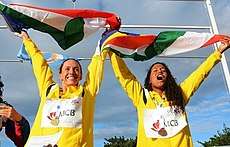Indian Ocean Island Games
The Indian Ocean Island Games (French: Jeux des îles de l'océan Indien) is a multi-sport event held every four years among athletes from Indian Ocean island nations. The Games was created by the International Olympic Committee (IOC) in 1977 and currently gather the island nations and territories of Mauritius, Seychelles, Comoros, Madagascar, Mayotte, Réunion and the Maldives.[1] The number of athletes who participate has increased over the years, it went from 1000 athletes in 1979 to over 1500 participants in 2003 and 2007 and over 2000 participants in 2019.
 Official Logo of the IOIG in 2019 | |
| First event | 1979 Indian Ocean Island Games |
|---|---|
| Occur every | 4 years (expected) |
| Last event | 2019 Indian Ocean Island Games |
| Purpose | Multi-sport event for islands in the Indian Ocean |

Origins
From 1947 until 1963, a precursor called Indian Ocean Games Triangulaire was organized between Madagascar, Mauritius and Réunion. In 1963, a football match in Madagascar between Mauritius and Madagascar was abandoned at 1-1 after 54 minutes, and Madagascar declared themselves as winners of the tournament. After this match Mauritius refused to play and the tournament was not held again.
In 1974, the Regional Olympic Committee of Réunion decide to organise a multi-sport competition in the Indian Ocean. This was adopted by the International Olympic Committee in 1976. The competition was initially called the 'Indian Ocean Games', but the name was changed to the 'Indian Ocean Island Games' before the first games, without the participation of Sri Lanka, which was initially included.
The objectives of the games are to contribute to regional cooperation through the development of sport in the region; build friendship and mutual understanding between the peoples of the islands of the Indian Ocean, in the spirit of Olympism; allow athletes to have, every four years, a competition whose interest and level are commensurate with the real sport of the region; and create a regional event whose repercussions will ensure the development of infrastructure of countries in the area. In 2019 the games involve 7 islands, 14 disciplines and 2,000 athletes.
IOIG games
Five countries participated in the creation of the Games: Sri Lanka, Seychelles, Mauritius, Comoros and Reunion. They drafted the Charter of the Games. Originally, the Games were to take place every four years, however this frequency was not observed from 1979 to 2003.
| Year | Edition | Date | Host Country | Host City | Reference |
|---|---|---|---|---|---|
| 1979 | 1 | Saint Denis, Réunion | [2] | ||
| 1985 | 2 | Curepipe | [3] | ||
| 1990 | 3 | Antananarivo | [4] | ||
| 1993 | 4 | Victoria | [5] | ||
| 1998 | 5 | Saint Denis | [6] | ||
| 2003 | 6 | Moka | [7] | ||
| 2007 | 7 | 9–19 August | Antananarivo | [8] | |
| 2011 | 8 | 5–14 August | Victoria | [9] | |
| 2015 | 9 | 1–8 August | Saint Denis | [10] | |
| 2019 | 10 | 19–28 July | Port Louis | [11] | |
| 2023 | 11 | Future event | Malé | [12] |
Participating countries
| Total | |||||||||||
|---|---|---|---|---|---|---|---|---|---|---|---|
| Comoros | ✓ | ✓ | ✓ | ✓ | ✓ | ✓ | ✓ | ✓ | ✗ | ✓ | 9 |
| Madagascar | ✗ | ✓ | ✓ | ✓ | ✓ | ✓ | ✓ | ✓ | ✓ | ✓ | 9 |
| Maldives | ✓ | ✓ | ✓ | ✓ | ✓ | ✓ | ✓ | ✓ | ✓ | ✓ | 10 |
| Mauritius | ✓ | ✓ | ✓ | ✓ | ✓ | ✓ | ✓ | ✓ | ✓ | ✓ | 10 |
| Mayotte | ✗ | ✗ | ✗ | ✗ | ✗ | ✓ | ✓ | ✓ | ✓ | ✓ | 5 |
| Réunion | ✓ | ✓ | ✓ | ✓ | ✓ | ✓ | ✓ | ✓ | ✓ | ✓ | 10 |
| Seychelles | ✓ | ✓ | ✓ | ✓ | ✓ | ✓ | ✓ | ✓ | ✓ | ✓ | 10 |
Events
|
|
|
|
All-time medal table
As of 2015.
| Rank | Nation | Gold | Silver | Bronze | Total |
|---|---|---|---|---|---|
| 1 | 584 | 534 | 461 | 1579 | |
| 2 | 405 | 462 | 504 | 1371 | |
| 3 | 353 | 339 | 371 | 1063 | |
| 4 | 214 | 201 | 240 | 655 | |
| 5 | 4 | 11 | 48 | 63 | |
| 6 | 2 | 8 | 9 | 19 | |
| 7 | 1 | 7 | 14 | 22 | |
| Totals (7 nations) | 1563 | 1562 | 1647 | 4772 | |
2003 France Indian Ocean medals have been counted for Réunion.
See also
- Indian Ocean Games Triangulaire
References
- "Regional and Sub-regional Games Fonds Sheet" (PDF). Historical Archives, Olympic Studies Center. Comité International Olympique. pp. 37–38. Archived from the original (PDF) on 2 February 2017. Retrieved 24 January 2017.
- "JIOI 1979 – 1re Édition à L'Île de la Réunion". 10e Joi Maurice 2019 (in French). Archived from the original on 3 February 2019. Retrieved 26 July 2018.
- "JIOI 1985 – 2e Édition à Maurice". 10e Joi Maurice 2019 (in French). Archived from the original on 27 July 2018. Retrieved 26 July 2018.
- "JIOI 1990 – 3e Édition à Madagascar". 10e Joi Maurice 2019 (in French). Archived from the original on 27 July 2018. Retrieved 26 July 2018.
- "JIOI 1993 – 4e Édition aux Seychelles". 10e Joi Maurice 2019 (in French). Archived from the original on 27 July 2018. Retrieved 26 July 2018.
- "JIOI 1998 – 5e Édition à L'Île de la Réunion". 10e Joi Maurice 2019 (in French). Archived from the original on 27 July 2018. Retrieved 26 July 2018.
- "JIOI 2003 – 6e Édition à Maurice". 10e Joi Maurice 2019 (in French). Archived from the original on 27 July 2018. Retrieved 26 July 2018.
- "JIOI 2007 – 7e Édition à Madagascar". 10e Joi Maurice 2019 (in French). Archived from the original on 27 July 2018. Retrieved 26 July 2018.
- "JIOI 2011 – 8e Édition aux Seychelles". 10e Joi Maurice 2019 (in French). Archived from the original on 27 July 2018. Retrieved 26 July 2018.
- "JIOI 2015 – 9e Édition à L'Île de la Réunion". 10e Joi Maurice 2019 (in French). Archived from the original on 27 July 2018. Retrieved 26 July 2018.
- "10e Joi Maurice 2019" (in French). Archived from the original on 11 July 2019. Retrieved 9 May 2019.
- "11e Joi Maldives 2023" (in French). Retrieved 27 July 2019.